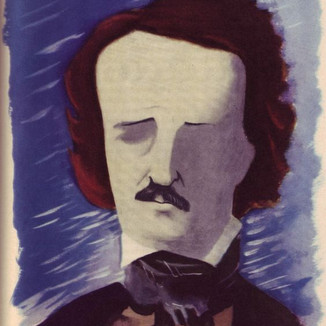Happy Birthday, Edgar Allan Poe!
- Karen Lee Street
- Jan 18, 2018
- 4 min read

Edgar Allan Poe-- author, critic, editor, lecturer -- was born on 19 January 1809 in Boston, the city where his mother, Eliza Arnold Poe, first arrived when she and her mother emigrated from England to America. His father, David Poe Jr., and his family were from Baltimore, the place where Poe died 7 October 1849. He lost both his parents before he was three years old.
Most of Poe's childhood was spent living in Richmond, Virginia—or enough for him to consider himself a "Virginian gentleman". Poe met his wife Virginia in Baltimore and from 1837 they made their home in either Philadelphia or New York.

Evidence suggests that Poe spent his entire life in the U.S., bar five years (1815 - 1820) living in London with his adoptive parents John and Frances Allan.
Why is this relevant? Because Poe told it differently. Apparently.
According to various (dubious) accounts, Poe left America after accumulating gambling debts and went to Greece to join in the Greek revolution. He then went on to St. Petersburg where he quarreled with the Russian authorities and ended up needing to be rescued by the American consul, Henry Middleton, who then sent him home.

Whether this was one of Poe's hoaxes or someone else embellished Poe's biography isn't clear (to me at least), but references to Poe's adventures in Greece and Russia have been recorded in several biographies and newspaper articles such as Poe's obituary in the Richmond Semi-Weekly Examiner.
French poet Charles Baudelaire, who greatly admired Poe's work and translated it into French, included this yarn of Poe's adventurous world travels in his biographical notes on Poe:
"Some unfortunate gaming debts led to a temporary coolness on the part of his adopted father, and Edgar — a very curious fact, and one proving, say what they will, a strong dose of chivalry in his impressionable brain — conceived the project of aiding the Greeks in their struggle against the tyranny of the Turks."

"What became of him in the East, what he did there, whether he ever really had a chance of studying the classic borders of the Mediterranean, why he was found at St. Petersburg, without a passport, and, politically comprised, compelled to appeal to the American ambassador to escape the penalty of the Russian laws, and for aid to return home — all this is still a mystery: we know nothing of it: this is a void which he alone could have filled up. Edgar Poe’s life, his youth, his adventures in Russia, and his correspondence have for long been announced in the American journals, but have not yet appeared."
Perhaps these were stories Poe intended to write one day, in a similar arena to "The Unparalleled Adventure of One Hans Pfaall", "A Descent into the Maelström", or "The Gold Bug", or a hoax, the type of misleading yarn of which he was so fond.
Certainly Poe admired tales of adventure, exploration, and antiquities. John L. Stephens wrote several books beginning with the title “Incidents of Travel ... ”, which were incredible hits when first published.
According to a letter reproduced on www.eapoe.org, Poe asked Rufus Griswold "if you can let me take a peep at Stephens’ “Yucatan”, if you have it." Poe favourably reviewed Incidents of Travel in Egypt, Arabia, and the Holy Land (1837) in the New York Review, October 1837, and Incidents of Travel in Central America, Chiapas, and Yucatan (1841) in Graham’s Magazine, August 1841, noting:

“The work is certainly a magnificent one— perhaps the most interesting book of travel ever published" -- high praise from the tough critic, and a quote still used to advertise the merit of the work, which is still available.
I read my grandfather's copy when I was a child, along with Richard Halliburton's Complete Book of Marvels (1941), which included Halliburton's expeditions to Aztec and Mayan ruined cities Stephens explored and also the Incan city of Machu Picchu in Peru, following on from Harry Bingham III's 'discovery' of the lost city 24 July 1911. (Local Peruvians knew of the Machu Picchu...)
Poe's interest in John Lloyd Stephens' accounts of his expeditions and the adventure stories Poe wrote inspired the basic plot of the forthcoming Edgar Allan Poe and the Jewel of Peru (8 May 2018).
So, happy birthday to Edgar Allan Poe, creator of the modern detective story, master of the macabre, innovator in science fiction writing, dabbler in adventure yarns, extraordinary poet, and man who enjoyed a good hoax. Those who follow my facebook postings about my Poe/ Dupin mystery trilogy will be aware of how many artists have illustrated Poe's tales and Poe himself, which continue to inspire 209 years after his birth.

Sources: see the wonderful www.eapoe.org for copies of newspaper articles noted and reference to Poe's reviews of Stephen's book, which is still quoted today by its publisher (still in print).
Illustrations:
2) Sangorski & Sutcliffe frontispiece
4) Édouard Manet (1875)
5) E. McKnight Kauffer 6) Horst Janssen 7) E. McKnight Kauffer
8 - 11) Photo of Incidents of Travel in Central America, Chiapas, and Yucatan (1841); illustration of author John L. Stephens; illustrations of sites by Frederick Catherwood
13) Harry Clarke
















Comments